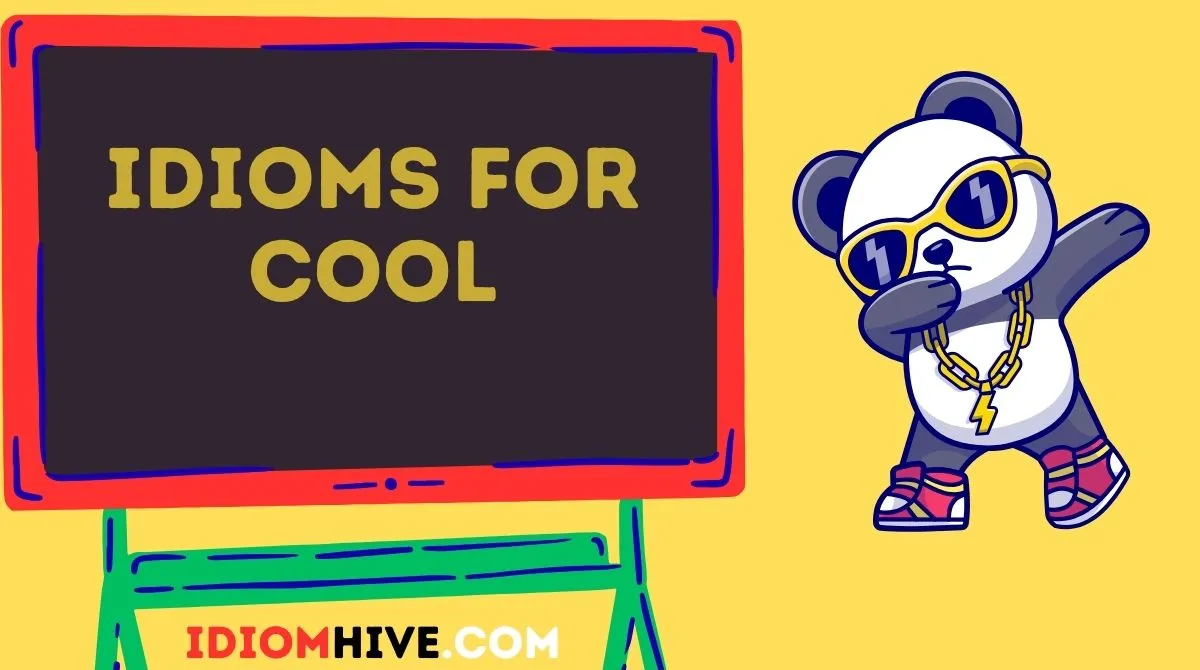Language is more than just words—it’s also about style, creativity, and culture. Idioms are short expressions that carry a meaning beyond their literal words.
They make conversations colorful and help speakers sound more natural. When we talk about being “cool”, we don’t always mean temperature. In English, “cool” can mean calm, impressive, stylish, or socially confident.
That’s why idioms for “cool” are so useful. They give you a way to describe people, moods, and situations in a fun, catchy way.
Whether you’re writing casually, chatting with friends, or even presenting in a professional space, idioms help you sound more fluent and engaging.
If you want to impress others with natural English, learning idioms for “cool” is the perfect step. Let’s explore them in detail.
Did You Know?
The word “cool” as a slang for “calm” or “stylish” has been around since the 1940s jazz culture. Musicians used it to describe smooth, confident performers. Over time, “cool” became one of the most universal slang words in English, still popular today across music, movies, and daily conversation.
Idioms About Staying Calm and Relaxed
Keep Your Cool

Meaning: Stay calm under pressure.
Example: Even during the argument, Sarah managed to keep her cool.
Alternative: Stay composed.
Reflection: Common in both formal and informal situations.
Cool as a Cucumber
Meaning: Extremely calm, even in stressful situations.
Example: He walked into the exam room cool as a cucumber.
Alternative: Unflappable.
Reflection: Often used in everyday conversations to describe relaxed people.
Lose Your Cool
Meaning: Get angry or upset suddenly.
Example: Tom lost his cool when his laptop crashed before the deadline.
Alternative: Blow up.
Reflection: Very informal, used often in emotional contexts.
Cool Down
Meaning: Calm yourself after being upset or angry.
Example: Take a walk and cool down before you speak.
Alternative: Calm down.
Reflection: Daily-life usage, especially in personal conversations.
Play It Cool
Meaning: Act calm and not show too much emotion.
Example: She liked him, but decided to play it cool and not text first.
Alternative: Keep it casual.
Reflection: Informal, often used in relationships or negotiations.
Cool Off
Meaning: Reduce anger or stress, take a break.
Example: They decided to cool off after the heated discussion.
Alternative: Take a breather.
Reflection: Used casually in both personal and work situations.
Chill Out
Meaning: Relax, stop worrying.
Example: Just chill out, everything will be fine.
Alternative: Take it easy.
Reflection: Very informal, often used among friends.
Take It Easy
Meaning: Relax and avoid stress.
Example: After exams, the students decided to take it easy.
Alternative: Unwind.
Reflection: Informal, everyday use.
Idioms About Being Stylish and Impressive
Look Cool
Meaning: Appear stylish and confident.
Example: He looks cool in those sunglasses.
Alternative: Look trendy.
Reflection: Informal, everyday compliments.
Too Cool for School
Meaning: Acting superior or too stylish.
Example: He always acts too cool for school in class.
Alternative: Acting smug.
Reflection: Mostly informal, slightly teasing.
Cool Cat
Meaning: A stylish, confident, and relaxed person.
Example: Jake is such a cool cat; everyone likes his vibe.
Alternative: Smooth operator.
Reflection: Informal, friendly slang.
Cool Customer
Meaning: Someone who remains calm and confident under stress.
Example: The negotiator was a cool customer during the crisis.
Alternative: Calm person.
Reflection: Semi-formal, often used in professional or business settings.
Cool Beans
Meaning: Expression of approval or excitement.
Example: You passed the exam? Cool beans!
Alternative: Awesome.
Reflection: Very casual, playful slang.
Stay Cool
Meaning: Remain calm or stylish.
Example: Stay cool, the presentation will go great.
Alternative: Keep calm.
Reflection: Informal and flexible.
Be Cool With Something
Meaning: To be okay or comfortable with a situation.
Example: I’m cool with waiting another day.
Alternative: Fine with it.
Reflection: Everyday casual use.
Cool Factor
Meaning: The quality of being stylish or admired.
Example: That car has a high cool factor.
Alternative: Trendy appeal.
Reflection: Casual, often in marketing or pop culture.
Act Cool
Meaning: Pretend to be confident or stylish.
Example: He tried to act cool when meeting his idol.
Alternative: Put on a front.
Reflection: Informal, daily speech.
Idioms About Friendship and Agreement
Be Cool With Someone
Meaning: To be friendly and have no conflict.
Example: We’re cool with each other now after the argument.
Alternative: On good terms.
Reflection: Very common in informal conversation.
Cool One’s Heels
Meaning: Wait patiently, sometimes unwillingly.
Example: The applicant cooled his heels in the lobby for an hour.
Alternative: Kill time.
Reflection: Used in both formal and casual contexts.
Make Cool With Someone
Meaning: Resolve conflict, be friends again.
Example: They finally made cool after years of rivalry.
Alternative: Make peace.
Reflection: Informal, friendship-related.
Cool Reception
Meaning: Unfriendly or unenthusiastic welcome.
Example: The new policy got a cool reception from employees.
Alternative: Cold shoulder.
Reflection: More formal, often in business or news contexts.
Keep Things Cool
Meaning: Avoid tension, remain friendly.
Example: Let’s keep things cool during the discussion.
Alternative: Stay peaceful.
Reflection: Flexible, casual or professional.
Idioms About Emotions and Behavior
Cold as Ice
Meaning: Uncaring, unemotional.
Example: Her response was cold as ice.
Alternative: Heartless.
Reflection: Informal, emotional contexts.
In the Cool Light of Day
Meaning: With calm thought after emotions pass.
Example: In the cool light of day, she realized her mistake.
Alternative: On reflection.
Reflection: Semi-formal, used in thoughtful writing.
Cool Hand

Meaning: Someone steady and confident under pressure.
Example: The surgeon was known as a cool hand.
Alternative: Steady hand.
Reflection: More formal, professional praise.
Keep a Cool Head
Meaning: Stay calm and rational.
Example: A leader must keep a cool head in emergencies.
Alternative: Stay level-headed.
Reflection: Formal, often used in leadership and advice.
Cool Spirit
Meaning: Calm and relaxed attitude.
Example: Her cool spirit helped the team stay motivated.
Alternative: Peaceful nature.
Reflection: More poetic, used in writing.
Cool Nerves
Meaning: Calmness in stressful moments.
Example: Pilots need cool nerves during turbulence.
Alternative: Composure.
Reflection: Formal and professional.
Cool Personality
Meaning: A person with a relaxed, likable character.
Example: His cool personality makes him popular with everyone.
Alternative: Chill person.
Reflection: Everyday life usage.
Be Cool-Headed
Meaning: Think calmly and clearly.
Example: She’s always cool-headed during arguments.
Alternative: Level-headed.
Reflection: Common in professional and casual conversations.
How to Use These Idioms in Daily Life
- In Speaking: Use casual idioms like chill out, cool beans, or too cool for school with friends.
- In Writing: For blogs, stories, or essays, idioms such as cool as a cucumber or in the cool light of day add style.
- In Professional Settings: Use polished idioms like keep a cool head, cool customer, or cool reception to sound confident without being too informal.
Common Mistakes Learners Make With Idioms
- Wrong: She is as cool as ice at parties.
Correct: She is as cool as a cucumber at parties. - Wrong: I kept my cool down during the meeting.
Correct: I kept my cool during the meeting. - Wrong: Let’s chill out the problem tomorrow.
Correct: Let’s chill out tomorrow.
FAQs
1. What does “keep your cool” mean?
It means to stay calm and not panic, especially in stressful situations.
2. Is “cool beans” still popular?
Yes, but it’s more playful and casual, often used by younger speakers or in fun conversations.
3. Can I use “cool as a cucumber” in professional writing?
Yes, but sparingly. It works best in semi-formal writing rather than very formal reports.
4. What’s the difference between “cool off” and “cool down”?
Both mean to calm yourself, but cool off can also mean to take a break or rest after activity.
5. Do idioms for “cool” mean the same worldwide?
Mostly yes, but the popularity may differ. For example, cool beans is more common in the US.
Conclusion
Idioms for “cool” are more than just fun expressions—they’re tools that help you sound natural, stylish, and fluent in English.
From staying calm in stressful situations to complimenting someone’s personality, these idioms add color to your speech and writing.
By practicing them in conversations, writing, and even professional settings, you can boost both confidence and clarity.
So, the next time you want to express calmness, style, or friendliness, remember these cool idioms and use them like a pro!










